Let's Introduce ourselves
About Our Community
Mission
As the body of Christ, we are called and sent to love and serve the world.
Mission is at the heart of everything we do at Christ the King Lutheran Church. But what does our mission statement actually mean?
Firstly, we are the body of Christ. That may sound difficult to grasp, but it is a metaphor meaning that we are Christ’s people on Earth.
How do we know we are? It comes down to being called and sent. We believe that God has reached out to us with the mission. Then sent us out into the world to do it.
That mission? To love and serve the world. Just like Christ did. See how it all comes together?
Our congregation is centered on this mission. And it means we welcome people from every walk of life to join us in building up that body of Christ we just talked about. We genuinely want your perspective, your story, and your gifts. They help us all to love and serve better.
It also means we seek to do good for others, as Christ would do for them. That means our congregation is rooted in outreach. We don’t keep God’s love for ourselves; it has to go out and do its good work. We do this through our Mission Grant Fund, frequent outreach and service events, and dedicated staff and volunteers whose job is to help us live this mission out.
Want to know more? The rest of this page introduces you to our community’s history and beliefs.


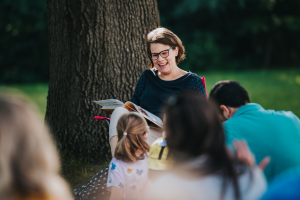
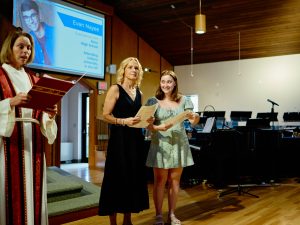

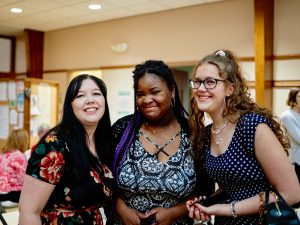
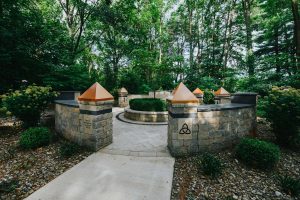
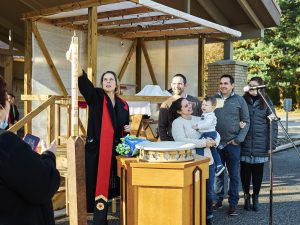
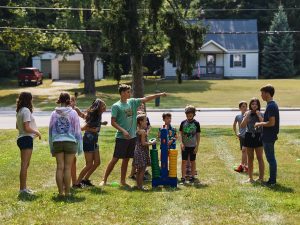
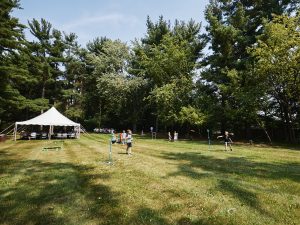






History
Continuity. Stability. Vision.
- 1969 - Christ the King is Founded, led by Rev. Loren J. Van Oort
- 1975 - Facility Expanded
- 1985 - Sanctuary space expanded
- 1998 - Christ the King facility grows to its current size
- 2000 - Pastor Steven Schwier becomes Senior Pastor
- 2012 - Christ the King begins two-year Missional Transformation
- 2017 - Pastor Caroline Satre becomes Senior Pastor
- 2020 - Christ the King begins offering a virtual worship service
Christ the King Lutheran Church began humbly as a church plant by the American Lutheran Church’s Church Extension Fund. Our first pastor was Rev. Loren J. Van Oort, who still can be found attending our Sunday services. Our other senior pastors have been Pastor Steven Schwier and Pastor Caroline Satre.
That’s right. In our 54-year history, we have only had three leading pastors. These uncommonly long tenures have helped us build a lasting legacy in the South Bend community and kept our community consistent over time.
Our facility grew as our congregation increased in numbers, expanding in 1975, 1985, and 1998. We love the heritage of our building but recognize that it is merely the stage for God’s work among us.
In 2012, we entered into a multi-year plan to define and establish our missional focus. Out of this effort, we started a Mission Grant Fund and staffed a part-time mission coordinator to ensure our outreach efforts made a real impact. Later in 2023, we began a new three-year strategic planning process aimed at building relationships within and beyond our walls, better serving our neighbors, and empowering and engaging our youth.
During the shutdowns of 2020, our congregation adapted. We began offering virtual worship, which we found enabled greater participation and engagement than ever before, as people who found it difficult to come to a physical service could feel their part in our community in this way.
God is the creator of the world; the giver of life; the source of wholeness, healing and forgiveness; the champion of the poor and oppressed; the power of new life and resurrection. God creates, redeems and continues to sustain the world. Christians know God as the Holy Trinity — one God: Father, Son and Holy Spirit. As Christians, we believe all people are created in God’s image and loved by God. We know about God thanks to the witness of the Scriptures and especially through Jesus Christ, who embodied God’s love for humanity. God’s grace is a gift, given through Christ and received by faith. There is nothing we can do on our own — good or bad — to earn this gift. We call this “good news” or the “gospel.” Through this gift of God, we are led by the Holy Spirit to love and work for justice and peace.
Christians believe that God came to us in Jesus Christ, a true human, humble and vulnerable. Jesus lived among us and demonstrated the good news in all he was and did. The good news is the promise that God loves us and saves us by grace alone. This promise was realized when Jesus was crucified. He died on the cross but was raised again in the body and in a new wholeness. As a result, through the gift of grace received by faith, all people can be made whole in Christ and set free to love and serve all people, particularly the vulnerable, just as God loves us.
Martin Luther, after whom the Lutheran branch of Christianity is named, once wrote, “Faith is a living, daring confidence in God’s grace, so sure and certain that you could stake your life on it one thousand times…. Through faith, a person will do good to everyone without coercion, willingly and happily; serving everyone, suffering everything for the love and praise of God, who has shown such grace.”
Faith, then, is not about intellectually agreeing to a set of beliefs but about living in a trusting relationship with God in response to God’s grace. Faith is our confident hope that living in God’s promises sparks renewal to love and serve neighbors, as God in Christ loves us.
We believe that all people are imperfect and are saved (made right with God) by God’s grace and God’s grace alone, through Christ. There is no special prayer you need to pray, no special state of mind you need to achieve and no good deed you need to perform. We believe that through the life, death and resurrection of Jesus Christ, God became one of us and took upon himself the sin and suffering of all the world. God did this to demonstrate God’s love for us. We believe that we receive the gift of grace by faith alone on account of Christ. We live in the tension of still being sinful but trusting that we are forgiven and that God is at work in us. The gift of grace expresses God’s unconditional love, and in response to that love we are set free to live gratefully and lovingly.
An important date in the Lutheran tradition is Oct. 31, 1517, when a German monk named Martin Luther started a movement known as the Reformation. He insisted the Bible showed that salvation could not be earned or bought, which was contrary to church teachings at the time. Luther believed salvation was a gift and a sign of God’s never-ending love. The most influential documents for our church were written by him and other Lutheran reformers. These are compiled in the Book of Concord. Key writings there include the Augsburg Confession and Martin Luther’s Small Catechism. We don’t believe that you are born or are baptized Lutheran, but if you participate in the Lutheran tradition, you identify as a Lutheran Christian.
The Lutheran movement was born as a reform effort in the heart of the medieval Christian church in Europe. The framework for our beliefs began in the 16th century, in what became known as the Protestant Reformation. American Lutherans trace their roots back through the mid-17th century, when early Lutherans arrived from Europe, settling in the Virgin Islands and present-day New York.
The ELCA (Evangelical Lutheran Church in America) was formed in 1987 when three Lutheran churches merged to form one denomination. The American Lutheran Church, the Association of Evangelical Lutheran Churches, and the Lutheran Church in America came together to form the Evangelical Lutheran Church in America.
Lutheran women were first ordained as pastors in the United States in 1970, in churches that eventually formed the ELCA. The first woman of color was ordained in 1979. In 2009, after a long period of studying the Scriptures and discerning our theological understanding of human sexuality, the barrier for ordination of LGBTQIA+ individuals was removed even as the church affirmed a variety of convictions. People of all sexual orientations and gender identities can serve as pastors and deacons in the ELCA. The gifts of all people called to ministry are received with joy.
All types of people and families are welcome — seriously! It doesn’t matter what your experience with religion has been or what kind of doubts or questions you might have about faith. You are welcome as you are.
God’s love for everyone compels us to stand against anything that harms or divides us from each other, such as injustice, prejudice and systemic oppression. We confess that churches, including the ELCA, have been complicit in this discrimination and division. We are, however, committed to doing the hard work of examining ourselves and engaging in honest dialogue with those who challenge exclusion and domination. Our desire is to do our part in God’s great work of bringing reconciliation, restoration and wholeness to the world. Confronting injustice is ongoing work done locally and throughout the world.
Suffering is part of the human experience — bad things happen. As we move through life, we encounter injustice, loss, fear and pain. It is a fact that humans make choices that cause each other troubles and sorrows. But there are also natural disasters and tragedies. The question of why bad things happen is honest and real. We don’t pretend to have easy answers, but God is with us through all of it. The resurrection of Jesus teaches us hope, and when we turn to God, we experience God’s grace in times of need.
Each person is created in God’s image, and following the example of Jesus, we’re called to show love and compassion for all people and creation. By working for healing, peace and justice in the world, we seek to uphold human rights and dignity.
We use our voices and actions to demonstrate God’s love. This takes place through everyday actions of members, such as being an active citizen or helping in a food pantry. It also takes place through our church’s advocacy work and ministries such as ELCA World Hunger and Lutheran Disaster Response. We join with Lutherans around the world in service work and justice through the Lutheran World Federation, our global communion of churches.
In these and many other ways, our church strives to put its faith into action to work for the common good. Or as our mission statement says, “As the body of Christ, we are called and sent to love and serve the world.”
Christ the King Lutheran Church is a member congregation of the Evangelical Lutheran Church in America (ELCA).
